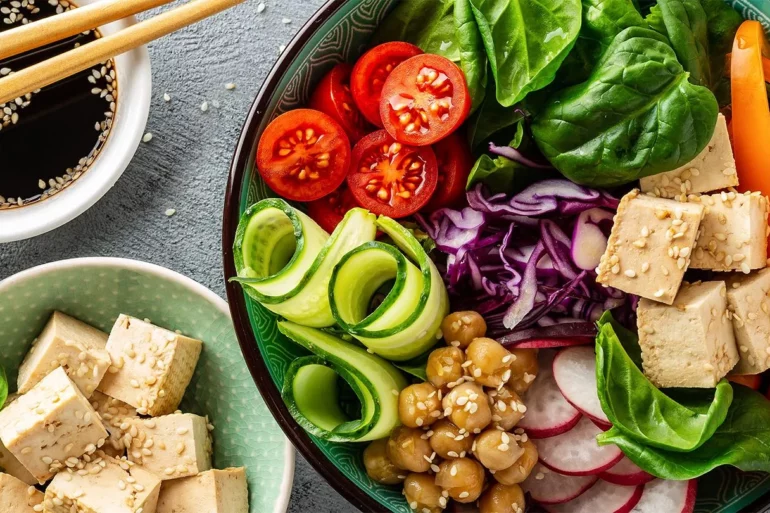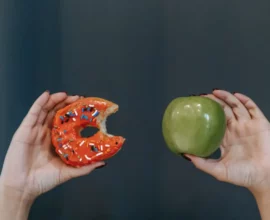Vegetarianism is gaining increasing popularity nowadays. This diet leads to a lower risk of chronic diseases and helps to lose weight.
But you may find it challenging to lose weight on a vegetarian diet, particularly when you consume too many highly processed foods or refined carbs.
In this article, we’ll guide you to lose weight on a vegetarian diet.
Concept of a Vegetarian Diet
Vegetarian diets are devoid of fish, meat, and poultry. Though a few people may follow this diet for demographic, religious, or ethical reasons, others feel allured due to its possible health benefits.
The four main types of vegetarian diets are as follows:
- Vegan
Excludes all animal products, including eggs, dairy, and honey
- Lacto-vegetarian
Allows dairy. Excludes fish, meat, eggs, and poultry
- Lacto-ovo-vegetarian
Allows eggs. Excludes fish, meat, and poultry
- Ovo-vegetarian
Allows eggs. Excludes fish, meat, dairy, and poultry
- Flexitarian
Includes some animal foods but is predominantly vegetarian
- Pescatarian
Includes fish but not meat diets
Usually, vegetarian diets focus on vegetables, fruits, legumes, whole grains, nuts, and seeds. Rich in fiber, micronutrients, and beneficial plant compounds, these foods are lower in fat, calories, and protein compared to animal foods.
As this diet emphasizes nutrient-rich foods, there’s a lesser risk of diabetes, cardiac disease, specific cancers, and high blood pressure. According to research, one can effectively lose weight by following a vegetarian diet.
But the benefits of vegetarianism mostly depend on the types of foods you consume and your dietary habits. Whereas, overeating or choosing excessively highly processed foods will offer lesser benefits. It has many disadvantages.
Vegetarian Foods Facilitating Weight Loss
For weight loss, you must opt for a vegetarian diet, rich in whole, minimally processed plant foods. Based on your particular regimen, you may include dairy or eggs too.
Vegetarian foods that help to lose weight loss are as follows:
- Fruits
Apples, oranges, grapes, berries, bananas, citrus, kiwi, and mango
- Starchy Vegetables
Potatoes, peas, corn, and winter squash
- Non-starchy Vegetables
Tomatoes, mushrooms, carrots, broccoli, cauliflower, bell pepper, zucchini, eggplant, celery, and cucumber
- Whole Grains
Brown rice, millet, quinoa, farro, barley, and bulgur wheat
- Beans and Legumes
Black beans, pinto beans, kidney beans, and lentils,
- Nuts and Seeds
Cashews, pistachios, almonds, walnuts, chia seeds, sunflower seeds, and nut butter
- Healthy Fats
Nuts, coconut, seeds, avocado, olive oil, nut butter, and cheese
- Lean Proteins
Milk, Greek yogurt, eggs, beans, legumes, nuts, seeds, nut butter, and soy products such as tempeh, tofu, and edamame
- Water and Other Healthy Beverages
Fruit-infused water, naturally flavored seltzer, and black coffee or tea
Vegetarian Foods to Avoid for Weight Loss
You should also restrict or avoid the following foods if you’re following a vegetarian diet for weight loss:
- Sugary Foods and Beverages
Cookies, energy drinks, pastries, candy, table sugar, sodas, fruit juices, and sweet tea
- Highly Processed Vegetarian Foods
Meat alternatives, veggie burgers, frozen desserts, freezer meals, and imitation dairy products
- Refined Carbs
Bagels, white pasta, white bread, and crackers
Moreover, avoid extra-large portions of any food that’s rich in sugar and calories.
6 Leading Tips to Lose Weight Through a Vegetarian Diet
Multiple strategies can help promote weight loss on a vegetarian diet, including:
- Incorporate Protein for Every Snack and Meal
A few examples of high-protein vegetarian foods are nuts, eggs, dairy products, beans, seeds, lentils, and soy foods, like tempeh, tofu, and edamame.
- Fill Half Plate with Non-starchy Vegetables
High-fiber veggies like cauliflower, leafy greens, broccoli, zucchini, and mushrooms, can help you stay full and reduce your calorie intake.
- Consume Mostly Whole Foods
Unprocessed foods like whole fruits and vegetables, don’t contain unnecessary ingredients.
- Choose Complex Carbs
These fullness-boosting foods comprise fruits, starchy vegetables, whole grains, and legumes.
- Restrict Highly Processed Foods
Avoid frozen meals, meat substitutes, and other ultra-processed foods, as they mostly host added salt, unhealthy additives, and extra sugar.
- Monitor Your Portions of High-calorie Foods
Pair seeds, nuts, and healthy fats with lower-calorie foods in such a way that you don’t overeat.
A balanced vegetarian diet focusing on whole plant foods and limiting refined carbs and highly processed products helps in weight loss.
Yet, you shouldn’t ignore important contributors to losing weight, such as exercise, sound sleep, and hydration.
A Sample Vegetarian Meal Plan to Lose Weight
We’ve prepared this 5-day meal plan for a vegetarian diet and to lose weight.
First Day
- Breakfast: shredded coconut, plain Greek yogurt with pineapple, and walnuts
- Lunch: chopped bell peppers, lentil soup, and guacamole
- Dinner: eggplant Parmesan served over whole-grain pasta and green beans
- Snack: berries or a whole-grain granola bar
Second Day
- Breakfast: steel-cut oats with apples, peanut butter, and cinnamon
- Lunch: hard-boiled eggs, tomatoes, green salad, avocado, and balsamic vinaigrette
- Dinner: whole-grain bread, black-bean soup with a dollop of Greek yogurt, and a side salad
- Snack: dark chocolate and almonds
Third Day
- Breakfast: spinach, hemp seeds, a smoothie bowl made from unsweetened almond milk, frozen berries, and a banana
- Lunch: carrots, an egg salad on whole-grain bread with strawberries, and hummus
- Dinner: carrots, brown rice, stir-fried with tofu, broccoli, soy sauce, and honey
- Snack: pistachios and dried mango
Fourth Day
- Breakfast: scrambled eggs with broccoli and cheddar, and berries
- Lunch: pinto beans, a burrito bowl with brown rice, onion, tomato, and avocado
- Dinner: sunflower seeds, zucchini noodles with marinara, and white beans
- Snack: an orange or string cheese
Fifth Day
- Breakfast: grapes, two eggs, and a slice of whole-grain toast with avocado
- Lunch: a salad with kale, goat cheese, dried cranberries, pecans, and edamame
- Dinner: a baked sweet potato and homemade chickpea patties alongside sautéed mushrooms
- Snack: plain Greek yogurt with cherries
Conclusion
A vegetarian diet emphasizing nutritious plant foods helps to lose weight. But
it’s essential to consume sufficient protein while curbing your portion sizes and intake of refined carbs, calorie-rich foods, and highly processed items.
Remember that all vegetarian foods aren’t equally healthy.




